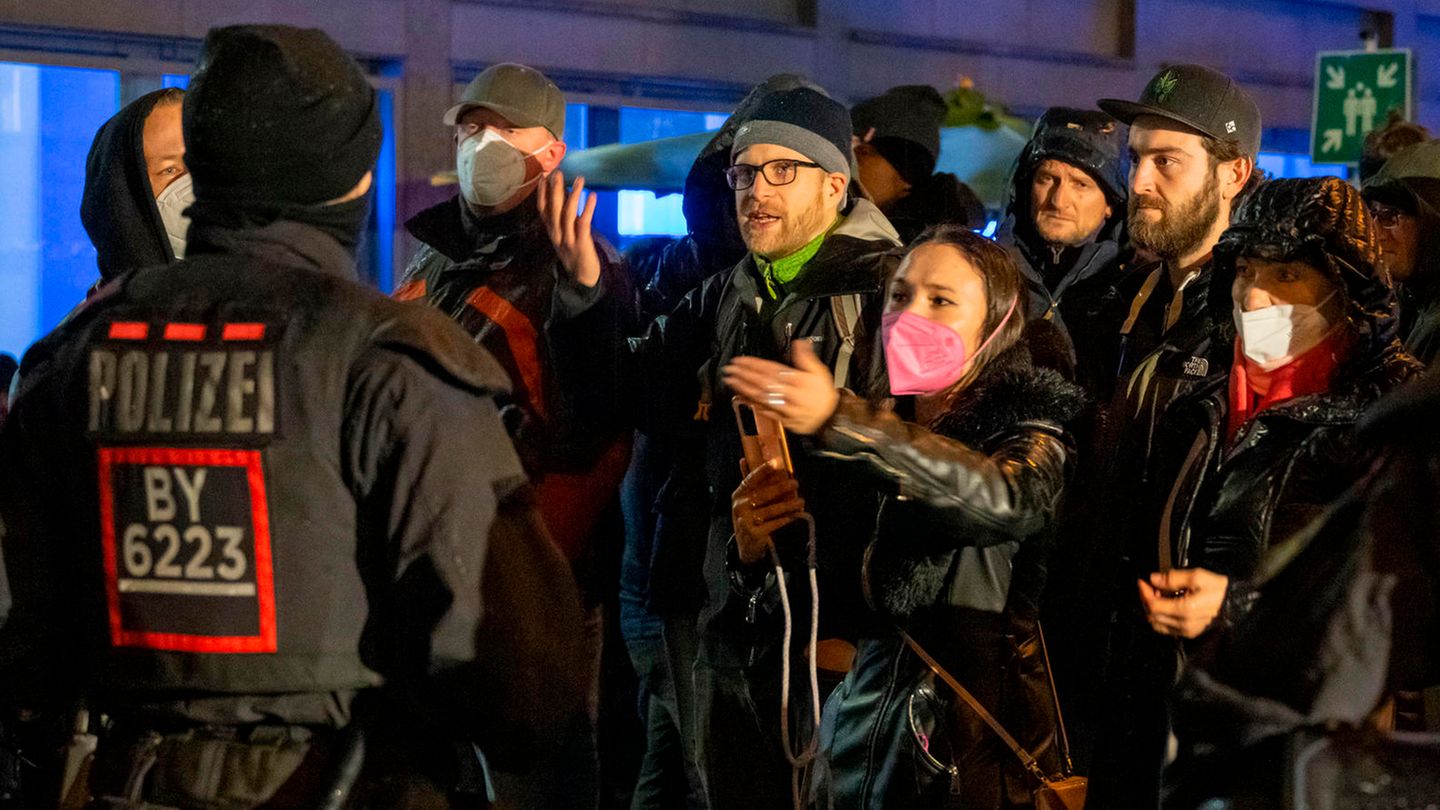No distance rules, attacks on police officers and hatred of the state: experts fear radicalization. And indeed: an explosive mixture is brewing during the protests against the corona policy. Right-wing extremists are specifically fueling the mood.
It is a minority, but it is vocal and is currently determining the images in social and other media: The protests against corona measures and a possible vaccination requirement in Germany increased sharply towards the end of 2021 and will not stop in the new year. Security authorities fear increasing aggressiveness of the demonstrators. Recently, numerous police officers in Bautzen, Mannheim and elsewhere were attacked and injured. But who are these people who deliberately disregard protective measures and defy state orders?
“Opponents of vaccinations, ‘Corona deniers’, those who are disaffected by politics and ‘losers’ of the crisis are being specifically addressed by extremist actors and ideologies,” says the Interior Ministry in Stuttgart. As a result, there is a risk of extremist appropriation and, in some cases, radicalization of these groups of people. “The state and its representatives are not legitimately criticized by the extremists, but are massively attacked.” According to the Office for the Protection of the Constitution in Baden-Württemberg, calls from these circles could have a motivating effect on “unstable individuals”.
Many East Germans distrust the state
Saxony’s Interior Minister Roland Wöller (CDU) assumes that a mandatory vaccination will further heat up the mood on the streets. “As the pandemic continued, the scene has become radicalized,” he says, and sees people getting caught in a dangerous vortex. The pandemic left traces, destroyed livelihoods or brought people to the edge of their existence. Now the displeasure becomes visible. “Right-wing extremists, Reich citizens and self-administrators are increasingly succeeding in penetrating the middle class.” In East Germany in particular, there is deep distrust of the state.
Right-wing extremism researcher Johannes Kiess from the University of Leipzig sees it similarly. In East Germany there are a particularly large number of people who are generally critical of democracy and the state, he says. “But one must also say that the state government in Saxony in particular has ignored the developing right-wing extremism. The quote from Kurt Biedenkopf that Saxony is immune to right-wing temptations is symptomatic of this.” Right-wing extremists, “Reichsbürger” and neo-Nazis were there from the beginning of the Corona protests, trying to mobilize the so-called center of society.
In Mecklenburg-Western Pomerania, too, Interior Minister Christian Ebene (SPD) warns that enemies of the constitution are using the Corona issue for their own purposes. The protests are mostly peaceful and “often borne out of the middle of society”. But level recently called on the demonstrators to show a clear edge against those participants who only wanted to create mistrust and discord with extreme positions and false statements.
Expert warns of terrorist structures
Level’s Thuringian colleague Georg Maier (SPD), like Wöller, expects a further radicalization of some of the Corona protesters. Maier even warned that terrorist structures could develop. Right-wing extremists are playing in the cards that anti-vaccination opponents radicalized. “They want violence on the streets, that’s part of the strategy.” Rights sought to turn people’s fears into political capital. Also and especially the AfD is trying to “ride this wave”.
In fact, the AfD has made the pandemic its number one topic. While she called for the disaster alert in Saxony at the beginning, she turned around with growing displeasure on the part of the people in the first lockdown. She now openly supports protests against the Corona policy and, with reference to the fundamental right of freedom of assembly, calls for the waiver of numerical restrictions.
The Bautzen AfD member of the Bundestag Karsten Hilse – a police officer by profession – blamed the rulers for the spiral of violence shortly after twelve of his former colleagues were injured during protests in Bautzen. Saxony’s Prime Minister Michael Kretschmer (CDU) “and his clique” wanted the escalation, he said. “You want the mess.”
The situation is similar in the west
In many places the police are registering a surge in the protests. While there were still 36 registered meetings in Brandenburg in the first week of December 2021, the number more than doubled to 95 at the end of the month. According to the police, most of the protest marches are not registered. On the last Monday in the old year alone, a total of 19,000 people took to the streets at 75 gatherings in 62 locations. In Saxony-Anhalt – where there is no limit to the number of demonstrations – there were around 16,700 at 37 gatherings on the same day.
It looks no different in the west. In Saarland a week ago on Monday, around 3,000 people were counted at a rally in Saarbrücken, in several cities in Rhineland-Palatinate it was 8,000, in Fulda in Hesse there were around 1,000. In Bavaria, opponents of the corona policy ran again last Wednesday to top form. In Munich alone, thousands of them marched through the city center. Bavaria’s interior minister Joachim Herrmann (CSU) attested some of them “considerable fanaticism”. The fact that some of them harness their own children or even arm themselves in individual cases is “something that worries us”.
In September, Rhineland-Palatinate saw where radicalization can lead. In Idar-Oberstein, a 20-year-old employee at a gas station was shot because he had informed the alleged perpetrator – a 49-year-old man – of the mask requirement. The case caused horror nationwide.
However, the demonstrations do not remain unchallenged. In Saxony, for example, the “Bautzen Together” and “#Wir Loves Freiberg” initiatives are mobilizing against deniers of the pandemic and critics of protective measures. The aim is to give a voice to those who abide by the rules. “It cannot be that an entire city falls into disrepute because of a minority, because the extent is appalling: Freiberg products are already being avoided, vacation trips to us are canceled”, said Freiberg’s mayor Sven Krüger.
Source From: Stern
David William is a talented author who has made a name for himself in the world of writing. He is a professional author who writes on a wide range of topics, from general interest to opinion news. David is currently working as a writer at 24 hours worlds where he brings his unique perspective and in-depth research to his articles, making them both informative and engaging.




